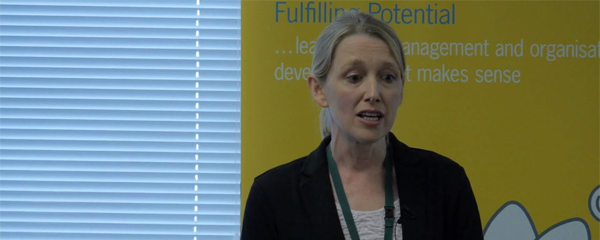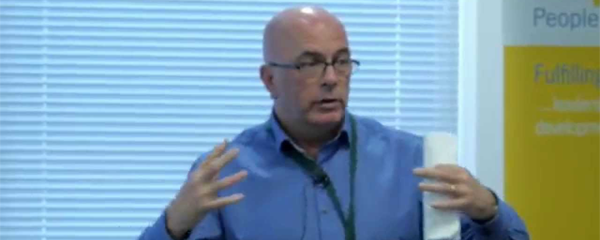Henry Stewart: Okay, so, um, this is the fifth of my Happy Workplace Round Tables, and I’ll be doing this every Wednesday for 13 weeks except when I’m on holiday. Now, of course, one of the reasons I’m doing this is because I want you to book on our courses, but I will give you some fabulous insights into what creates a happy workplace.
And today is how to play to your strengths, okay?
So, Gallup has found that for the UK, only 17% get to do what they do best at work every day. But where they do get to do what they do best, they’re 30-40% more productive.
Now I did a LinkedIn poll, uh, poll for this. So, um, this is a bit better than the Gallup poll. But it still has uh, 41 percent below, below the 50 percent mark and 24 percent saying that they only play to their strengths, they only play to their strengths, uh, for 0 percent to 25 percent of the time.
Okay, so let me, let me put that down.
Okay, so at Happy, we recruit to a job description, absolutely, but then we throw it away and we work out what, uh, what our actual talents are. Um, we moved from, uh, individual job descriptions to team descriptions. The team decides what they need to do and then let the individuals figure out who does what. Um, so maybe, maybe after six months, um, the teams put up Post It notes, um, on the walls and work out which they want to do next, uh, based on their strengths.
There will be some that nobody likes, but even those, uh, there are some people that, that would like them more than, more than others. So, I think they use StrengthsFinder. I Anyone use StrengthsFinder? Laura, you’ve used it, haven’t you?
Laura, what did you get from it?
Laura: Um, what, like, what are my strengths, or?
Henry Stewart: What are your strengths, and how do you use them?
Laura: So, well, basically, try to think about areas of what my strengths are that, that I might be able to use in my job. So for example, positivity is one of them. Might be like, well, just constantly think about things that I do enjoy doing.
Henry Stewart: Excellent. Yes. And you’re very positive Laura.
Um, anyway, one of my strengths is woo, which, which means winning over others. Um, um, oh, Strengths Finder is a Gallup project that works out your best strengths out of, out of, your five best strengths out of 33. So one of my strengths is woo, uh, which is winning over others.
So if I go to a trade show, I’m loving it. I get to meet people. Now there might be some people at the back who are a bit shy, but I’m having a great time. But then, uh, uh, but then we get the forms and I put them on my desk. And I’m not so good at that, but that’s obviously the key role of the job. Um, so in the past, I would not really get that done.
So what do you think we do now?
Anybody? What do you think we do now?
Dhwani: Delegate.
Henry Stewart: Yeah, have somebody else do it. Um, somebody who is, uh, strength is relator.
But obviously, uh, I’m the founder, so I can get, I can do that. Um, but let’s say that you have a frontline member of staff who organises the whole trade show, does the preparation, is great at Woo, and then says to the manager, but I’m not great at calling people. And the manager might say, oh, but we can’t be great at everything. Which means the organisation is not so productive. So at Happy we would ensure that the person who does the calling, that is their strength. So we look at people’s strengths and find out whether they do those strengths in their job. Indeed, we put their five key strengths on our organisation chart.
So, um, what are your best strengths? Let me put, put it in the chat. Here we go. What are your best strengths and what makes you feel magnificent? Okay. Um, that’s one thing that Marcus Buckingham does. So what makes you feel magnificent? So I’m going to put you into, into, uh, uh, breakouts for about four.
What are your strengths? What, and what makes you feel magnificent?
So folks, what are your best strengths? What made you feel magnificent? Put you in the chat, or, or, or feel free to call it out.
What are your best strengths? Tell us more Martin. Creativity.
Oops. Yara. Connecting people across different networks and sectors. Tell us more.
Clara: Yeah. I mean, I, I work across multiple different sectors and I’m like, I take great joy in just kind of thinking, Oh, there’s a person over here that’s got this interest or need. And I know somebody over there that they wouldn’t otherwise know. And so just kind of encouraging them to come together. So I get a lot of joy from that, but also I’m good, I’m good at it. And, uh, and I like to see people coming together that wouldn’t otherwise have kind of connected. Okay.
Henry Stewart: Excellent. Excellent.
And Dhwani, um, being organized and being logical.
Dhwani: Yeah, I suppose I love being a project plan and then just all thinking about, um, the next steps and yeah, just, um, sort of, and I love, I get the buzz from taking something off my, uh, list.
Henry Stewart: Do you?
Dhwani: And I
Henry Stewart: think that,
Dhwani: yeah.
Henry Stewart: Yeah, did you say, did you want to say more?
Dhwani: No, I just think, uh, I think I just, you know, systemic in a sort of logical way. So just, which I suppose is, you know, not always good.
Henry Stewart: Well, I think it is good. I think it is good. Okay. Um, okay.
So let me give you some case studies. Okay.
So we had one of our clients, a senior leader was spending 35% of his time micromanaging his budget, which was not his core skill, as his colleagues told us. Um, he was recruited because he was the best person in the industry in terms of software development. So what did we do?
We got somebody to micromanage, uh, budget, which was their core skill, um, which is their key strength.
Um, another, another example, Don Monk has in his book Mind the F ing Business, describes how one of his clients employs a phenomenal salesperson. But they’re hopeless at administrative, at administrative tasks, um, such as booking meetings, completing the CRM, um, customer relationship management, um, so the client hired a personal assistant to do that stuff for him. He no longer does any admin tasks himself. He focuses solely on what he does best.
Um, we have a, we, we had a colleague at Happy, Nicole, whose job in the apprenticeship programme was admin. And she didn’t feel that was her strength. She likes talking to people. So we thought about how she could talk to people. Um, and on the apprenticeship programme, there’s an advice and guidance programme at the beginning. So we got her to go on a training course about guidance. And now she does the advice and guidance sessions and her joy has gone from 60% to 90%.
So playing to the, playing to, to strengths is absolutely one of my three core principles.
We’ve got trust, we’ve got coaching, but also play absolutely playing to your strengths.
How can you get your people to do what they are great at, because that’s one of the core skills of, of a manager. Um, how can you get to do, to get your core people to do what they’re great at?
And again, yeah. I’ll put it in for, for, uh, four minutes. Let’s, yeah. Four minutes. Here you go.























